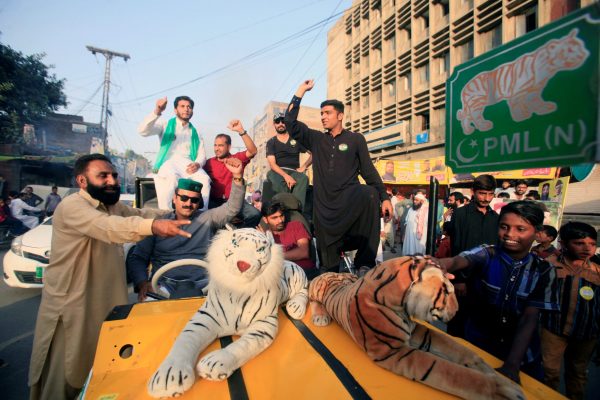The judiciary has emerged as the second-biggest challenge to the ruling civilian elites in particular, who think both the military and the judiciary have mounted a common front against them. The military, it seems, has come to rely more on the judiciary than on its brute might to fix problems that it thinks plague the country’s political and financial landscape.
This judicial strength has also defined Pakistan’s civil–military relations since the March 2016 emergence of the Panama Papers, which listed four London properties that apparently belong to the Sharif family. On 28 July 2017, the Supreme Court disqualified Sharif for withholding the fact that he had worked in his son’s Dubai-based company Capital FZE, and it referred the case on the London properties themselves to the anti-corruption watchdog, the National Accountability Bureau (NAB). The case proceedings are nearly complete, with insinuations by the Sharifs that the NAB is engaged in a witch hunt against them for being opposed to the role of the military establishment in the country’s foreign policy.
Sharif’s disqualification has also caused cracks within his own party: some 100 of its MPs have switched loyalties, with most of them joining cricketer-turned-politician Imran Khan’s anti-status quo Pakistan Tehreek-e-Insaf (PTI) party.
As if his direct confrontational posturing vis-a-vis the military and the judiciary were not enough, the former prime minister created yet another crisis for himself when, in an interview with DAWN, he took a swipe at the army: ‘Militant organisations are active. Call them non-state actors, should we allow them to cross the border and kill 150 people in Mumbai?’, he quipped in an indirect reference to the perpetrators of the multiple attacks in the Indian city of Mumbai in November 2008.
Sharif’s reference to Mumbai kicked up a massive political storm, prompting criticism even within his own party. Many of his MPs reportedly distanced themselves from the party, saying that Nawaz’s implication of the military’s complicity in the Mumbai attacks was untenable at best.
Both Sharif and Khan are focussing on Punjab — the most populous and politically critical province. Whoever wins the most seats in the province gets the key to national government in Islamabad. It has been Sharif’s stronghold up till now: Shahbaz Sharif, the younger brother of Nawaz Sharif, has ruled Punjab most of the years since 1997. But with the latest desertions from his party and with many more likely to come, that strength is in danger. At a public meeting in central Pakistan on 22 May, Shahbaz got a taste of defections in the party; when he stepped up to the stage to address party workers, three key party MPs were missing altogether.
Khan is viciously against the Sharifs and former Pakistani president Asif Ali Zardari, the de facto head of the Pakistan Peoples Party. Khan holds them responsible for Pakistan’s current dire socioeconomic straits and accuses them of having amassed personal wealth through corrupt practices.
General Qamar Bajwa, the current army chief, also shares this view. During an off-the-record meeting with about three dozen journalists on 9 March, Bajwa noted that the country needed to break out of its vicious cycle of misgovernance. ‘How can a country with up to 60 per cent black economy survive in the long run?’, he asked while listing the issues that currently occupy the attention both of the Army’s General Headquarters and of Saqib Nisar, the diminutive but aggressive chief justice of the Supreme Court.
Nisar has taken judicial activism to a new level by peeping into state-run institutions such as hospitals and admonishing the government for poor management. He has also ordered the withdrawal of over 13,000 police and elite forces that had without authorisation been guarding a number of politicians from all ends of the political spectrum.
The Sharifs interpret these actions as army–judiciary collusion to facilitate the victory of Khan’s PTI. But it was the judiciary that intervened to have the 10-yearly census held in 2017 after nearly two decades. The elections to the local governments in 2015 became possible only after the court ordered it so. Sharif dithered on the mainstreaming of Pakistan’s federally administered tribal area (FATA) regions bordering Afghanistan — a promise he had made in 2013. It was judicial pressure and the army’s perusal that led to the merger of the FATA regions into Khyber Pakhtunkhwa province on 31 May.
The 2018 elections are less about issues critical to the 210 Pakistanis and more about a contest between the pro- and anti-Sharif forces. Sharif has thus far crafted a public narrative that paints the establishment, the judiciary and Khan as ignoble and projects the former prime minister as a victim of their conspiratorial machinations. The opposition, led by Khan, says Sharif’s elitist and self-serving patronage-based model of governance has stunted national institutions and hence need to be thrown out.
Although doubts have emerged about whether general elections will be held on 25 July, the 2018 elections will in all likelihood throw up a hung parliament and a coalition of convenience among parties that have hitherto been at each other’s throats.
Will the next National Assembly fulfil the expectations of 100 million-odd registered voters? Or will it be no better than the committee of Richard Harkness’s definition: ‘a group of the unwilling, picked from the unfit, to do the unnecessary’?
Imtiaz Gul is Executive Director at the Centre for Research and Security Studies, Islamabad. You can find him on twitter at @ vogul1960 or you can email him at [email protected].

